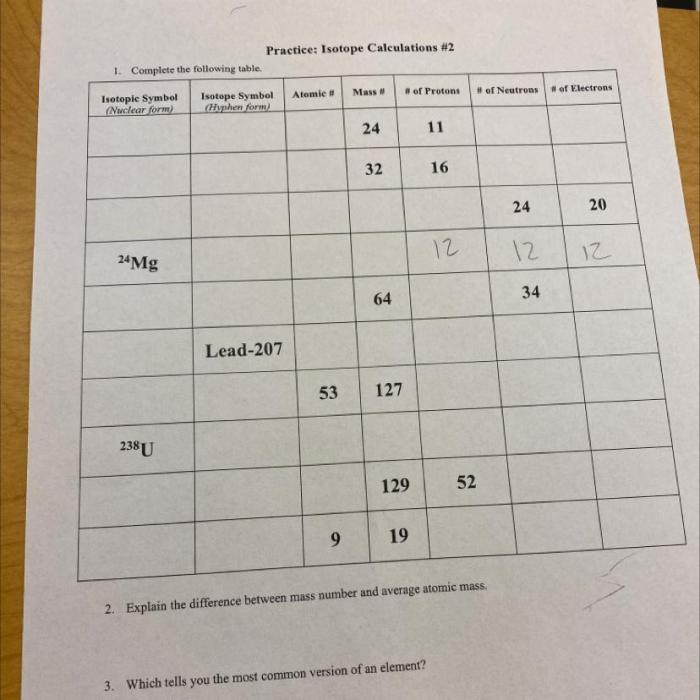Embarking on a journey into the realm of isotope calculations, we present the practice isotope calculations #2 answer key, an invaluable resource designed to illuminate the intricacies of this scientific endeavor. This comprehensive guide delves into the fundamental concepts, methodologies, and applications of isotope calculations, empowering you with the knowledge to navigate this complex field with confidence.
Throughout this exploration, we will unravel the significance of isotopes and their diverse applications across various scientific disciplines. We will meticulously examine the step-by-step procedures for calculating isotope ratios, exploring the indispensable role of mass spectrometry and other analytical techniques.
Furthermore, we will delve into the critical aspects of calibration and standardization in isotope analysis, ensuring the accuracy and reliability of your results.
1. Understanding Isotope Calculations

Isotopes are variations of an element that have the same number of protons but differ in the number of neutrons. Isotope calculations are essential in various fields, including archaeology, geology, environmental science, and medicine. These calculations help determine the age of artifacts, trace the movement of pollutants, and diagnose diseases.
Different types of isotope calculations include:
- Isotope ratios: Comparing the abundance of different isotopes of an element in a sample.
- Isotopic dating: Determining the age of materials based on the decay of radioactive isotopes.
- Stable isotope analysis: Studying the variations in stable isotopes to understand environmental processes and biological systems.
2. Methods for Isotope Calculations
Isotope calculations involve several steps:
- Sample preparation: Extracting and purifying the isotopes of interest.
- Mass spectrometry: Analyzing the mass-to-charge ratio of the isotopes using a mass spectrometer.
- Calibration and standardization: Ensuring the accuracy and precision of the measurements by comparing the results to known standards.
Advanced analytical techniques, such as laser ablation inductively coupled plasma mass spectrometry (LA-ICP-MS), allow for precise and sensitive isotope analysis.
3. Applications of Isotope Calculations: Practice Isotope Calculations #2 Answer Key
Isotope calculations have wide-ranging applications:
- Archaeology: Dating artifacts and understanding ancient human migration patterns.
- Geology: Determining the age of rocks and studying geological processes.
- Environmental science: Tracing the movement of pollutants, understanding climate change, and studying ecosystem dynamics.
- Medicine: Diagnosing diseases, monitoring drug metabolism, and developing new therapies.
For example, carbon-14 dating has revolutionized archaeology by providing accurate age estimates for organic materials.
4. Data Analysis and Interpretation
Data analysis and interpretation in isotope calculations involve:
- Statistical analysis: Using statistical tools to determine the significance of isotope data.
- Modeling: Developing mathematical models to simulate and predict isotope behavior.
- Drawing conclusions: Making inferences based on the analyzed data and considering potential sources of error.
Proper data analysis is crucial for extracting meaningful information from isotope calculations.
5. Limitations and Challenges
Isotope calculations have limitations and challenges:
- Sources of error: Uncertainties can arise from sample preparation, measurement techniques, and data interpretation.
- Complex systems: Isotope systems can be complex, making it challenging to accurately interpret the data.
- Ongoing research: Isotope calculation techniques are continuously being refined and improved to address these challenges.
Despite these limitations, isotope calculations remain a powerful tool for scientific research and practical applications.
Expert Answers
What is the purpose of practice isotope calculations?
Practice isotope calculations provide a structured approach to reinforce your understanding of isotope calculation principles and techniques, enabling you to apply them effectively in real-world scenarios.
How can I use the practice isotope calculations #2 answer key?
The practice isotope calculations #2 answer key is designed to provide step-by-step solutions to the practice problems, allowing you to verify your answers and identify areas where further clarification is needed.
What are the benefits of using isotopes in scientific research?
Isotopes serve as powerful tools in scientific research, enabling scientists to trace processes, determine ages, and gain insights into the composition and evolution of various systems.